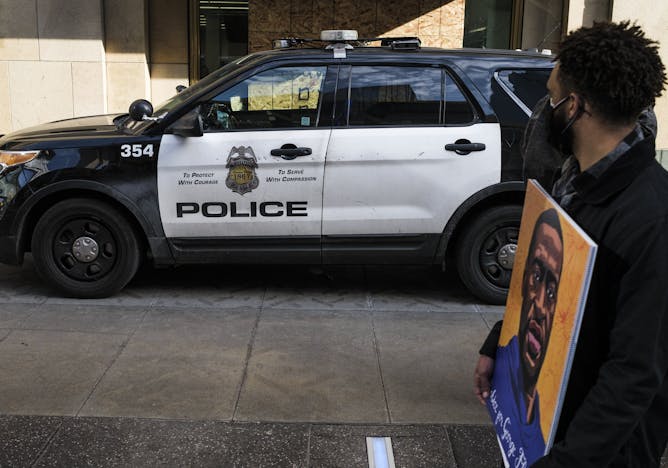|
|
|
|
Police reform in the U.S. isn’t easy. If it were, authorities in Minneapolis could look back at how Baltimore and Ferguson successfully overhauled their departments following the deaths of unarmed Black men during confrontations with city officers. Truth is, they didn’t – well, not successfully.
Perhaps a better example, suggest Georgia State University criminal justice scholars Thaddeus and Natasha Johnson, is Cincinnati. In 2001, the city saw major unrest over the shooting death of a Black teen. But what came next was an innovative agreement among community activists, city managers and the police over a package of reforms. Getting the community on board is key, and could be further enhanced by refocusing officers' time away from low-level infractions, suggests Thaddeus Johnson. He should know; he was a cop for 10 years.
Also today:
|
Matt Williams
Religion & Ethics Editor
|

|
|

Getting police and community on board with reforms is crucial for success.
Stephen Maturen/Getty Images
Thaddeus L. Johnson, Georgia State University; Natasha N. Johnson
Attempts to reform US police departments fail when they are unable to get community support. Perhaps it is time to take a different tack, argue two criminal justice scholars – one a former cop.
|
Economy + Business
|
-
Gayle Rogers, University of Pittsburgh
Until the late 1800s, moments of widespread high-risk financial gambling weren't considered manias but the results of individual actors, who bore responsibility for the disastrous results.
-
Chris Knoester, The Ohio State University; Richard J. Petts, Ball State University
Polls have consistently found robust support for this benefit, with a growing share of the public approving of paid time off for dads.
|
|
Environment + Energy
|
-
Sam Purkis, University of Miami
Scientists watched in real time as rising ocean heat transformed the sprawling reef. It was a harbinger for ecosystems everywhere as the planet warms.
|
|
Science + Technology
|
-
Anne Fishel, Harvard University
All that planning, shopping, prepping, serving and cleaning can pay off with better physical and mental health for all members of the family.
|
|
Ethics + Religion
|
-
Wayne Eastman, Rutgers University
A game theory expert explains why a witness to a troubling situation who is in a group may feel a lesser sense of personal responsibility than a single individual.
|
|
Education
|
-
Abbie Goldberg, Clark University
These are some of the key features and policies that trans prospective students may want to consider in their college exploration process.
|
|
Podcast
|
-
Gemma Ware, The Conversation; Daniel Merino, The Conversation
Plus, how researchers have discovered a biological switch that can turn neuroplasticity on and off in the brain. Listen to episode 13 of The Conversation Weekly podcast.
|
|
From our international editions
|
-
Trevor Duke, The University of Melbourne
For now, governments and health services should invest in bedside oxygen concentrators and oxygen generators to supply whole hospital needs.
-
Michael J. Armstrong, Brock University; Paul Seaborn, University of Virginia
U.S. Congress might not pursue full cannabis legalization this year. But it should still provide Americans with some of Canada's legal clarity.
-
Uma S Kambhampati, University of Reading
COVID has now claimed over 200,000 lives on the subcontinent, and the knock-on effects are likely to be substantial.
Today’s graphic

|
|
| |
| |
| |
| |

|
| |
| |
| |
| |
| |
| |
| |
| |
|
|
|
|
|
|
|